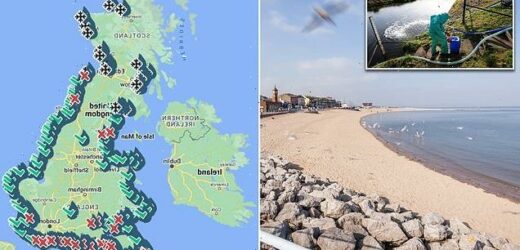Sewage leaks could affect British seafood as analysis shows wastewater was dumped in waters where shellfish live 29,000 times
- Sewage was dumped in shellfish-inhabited water almost 29,000 in the last year
- Waters filled with oysters, mussels and clams were exposed to untreated waste
- Experts warn that contaminated shellfish poses a risk to human health
- The longest ‘dump event’ was at Morecambe Bay, south of the Lake District
Sewage was dumped into coastal waters where shellfish live almost 29,000 times last year, an analysis has revealed.
Untreated waste was released into English waters containing oysters, mussels and clams for more than 207,000 hours in 2021, a study found.
The longest ‘dump event’ at Morecambe Bay, south of the Lake District in the north-west, lasted 5,000 hours.
Experts warn that contaminated shellfish are a source of bacteria and viruses that pose a risk to human health.
Whitstable oyster harvesting was halted due to sewage, amid reports of norovirus-type symptoms in those who ate them.
The Kent town – famed for its oysters – is supplied by Southern Water, which was fined a record £90million last year.
David Jarrad, head of the Shellfish Association, said of the Liberal Democrats’ findings: ‘Sewage flowing into water that contains shellfish runs the risk they will then contain E. coli or norovirus.
‘Consumers won’t trust shellfish if that is the case.
Mr Jarrad said firms’ ratings could be downgraded or they could be put out of business if forced to relocate or pay for heat treatments.
South West, Southern Water and Anglian Water had the worst records, the analysis found. In Sussex, Southern dumped waste into Chichester harbour, known for its oysters, for 4,996 hours in one overflow.
South West dumped sewage off Exmouth beach, which is also home to shellfish, for 1,128 hours in one go.
United Utilities’ 5,000-hour dump at Morecambe might have lasted even longer, as it believed its sewage monitor only worked 15 per cent of the time.
Kelsey Thompson, manager of Morecambe Bay Oysters, which sells two million oysters a year, said: ‘These water companies have a moral obligation to minimise sewage outflows.’
Beaches in England were shut last week due to sewage dumps as it was revealed that water firm bosses enjoyed an average 20 per cent rise in pay and bonuses in the past year.
Tim Farron, Lib Dem environment spokesman, condemned the companies for ‘raking in billions of pounds in profits and forking out eye-watering bonuses to their CEOs’.
Water companies are allowed to release some untreated sewage into rivers and the sea to prevent Britain’s mostly Victorian sewers being overwhelmed by too much rainfall.
But critics say too much is released and better infrastructure is needed.
A Downing Street spokesman yesterday said firms’ failure to reduce sewage discharges was ‘absolutely unacceptable’.
‘They have a duty to put their customers before shareholders and we would expect them to take urgent action on this issue or face fines,’ he added.
A spokesman for Water UK, which represents the companies, said they agreed there is an ‘urgent need for action to tackle the harm caused to the environment’ and are investing in £3billion of improvements.
Source: Read Full Article


